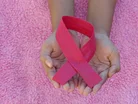How Manufacturing is Aiding the Fight Against Breast Cancer

In the fight against breast cancer global manufacturing has a vital role to play.
Estée Lauder Companies’ Breast Cancer Campaign for example was founded back in 1992, and has since ( in combination with the company's charitable foundation) funded more than US$131m, for lifesaving global research, education, and medical services.
Last year in China, the campaign celebrated it's 20th anniversary and announced a 3-year partnership with China's Women's Development Foundation to launch a Breast Cancer Care programme.
In the UK the company also supports London's first ever specialised breast cancer centre, Future Dreams House.
The Ford Motor Company has dedicated more than US$139m to the fight against breast cancer, pioneering the SupportBelt™ the first seat belt accessory designed by a U.S. auto manufacturer to help mastectomy patients travel comfortably after surgery.
Ford also has its Warriors in Pink® wear and gear, where 100% of Ford profits are donated to two breast cancer organisations: Susan G. Komen® and Pink Fund®.
All this incredible funding and support helps support the efforts of pharmaceutical manufacturers, as they research, innovate and experiment to find a cure for breast cancer.
Manufacturing drugs to end breast cancer
Pharmaceutical manufacturers continue to make marked progress in developing breast cancer treatments, which include innovative immunotherapies, targeted drug therapies and hormone-based treatments.
Many pharmaceutical manufacturers are also developing and trialing what's known as liquid biopsy technologies. These technologies detect circulating tumour DNA in the blood through non-invasive means, helping to better monitor breast cancer progression and treatment response.
The exploration of new possibilities for treatment continues as does the manufacturing and refinement of existing forms of treatment.
Developing drugs & solutions
These forms of treatment include Pfizer's Ibrance, a CDK4/6 inhibitor that targets proteins responsible for cancer cell growth.
This drug is one of the most prescribed targeted therapies for advanced breast cancer, demonstrating promising results in delaying disease progression.
Meanwhile Roche has been helping to treat patients through manufacturing Herceptin, a groundbreaking drug treatment for HER2-positive breast cancer.
This is an especially aggressive cancer strain, with Herceptin targeting the HER2 receptor on the surface of the cancer cells to inhibit growth, subsequently improving survival rates.
There's also pharmaceutical giant Merck that manufactures the drug KEYTRUDA.
KEYTRUDA is an immune checkpoint inhibitor that works by harnessing the immune system to fight cancer cells.
This innovative drug has already been approved for treating triple-negative breast cancer (TNBC) one of the most challenging types of cancer to treat. This drug is typically used in combination with chemotherapy, extending the survival of TNBC patients.
“KEYTRUDA continues to change the way non-small cell lung cancer is treated across earlier and metastatic disease regardless of PD-L1 expression,” said Dr. Marjorie Green, senior vice president and head of late-stage oncology, global clinical development, Merck Research Laboratories.
“This approval marks a pivotal moment for the lung cancer community by providing certain patients with earlier stages of non-small cell lung cancer and healthcare providers with an important new treatment option.”
AstraZeneca: Tackling BRCA's role in breast cancer
AstraZeneca has been advancing research and development into breast cancer for the last 40 years.
One area where they have made significant process is in treating and diagnosing breast cancer sufferers with BRCA gene mutations.
A BRCA mutation is a mutation of either the BRCA1 or BRCA2 genes, genes which work to suppress tumours. BRCA mutations are hereditary, and increase the likelihood of a person developing breast cancer by 45% all the way to 85%.
AztraZeneca's drug Lynparza is specifically effective at treating patients with this mutation.
The drug works by inhibiting the PARP enzyme which prevents cancer cells from repairing their DNA and subsequently leads to cell death.
AstraZeneca has also been helping to better screen and diagnose patients with the BRCA mutation, partnering with Owkin to develop a powerful diagnostics tool-an AI gBRCA pre-screen solution for breast cancer.
"On average, a woman with a BRCA1 or BRCA2 gene mutation has up to a 7 in 10 chance of being diagnosed with breast cancer by age 80," says Kristina Rodnikova, Head of Global Commercial Diagnostics, Oncology at AstraZeneca.
"This collaboration with Owkin underscores our commitment to advancing precision medicine, helping address the unmet need and identifying patients at risk of harbouring BRCA mutations to improve their outcomes."
As companies across the manufacturing sector-from pharma to cosmetics-continue to lend their efforts to the fight against breast cancer, we come closer every year to a cure.
Make sure you check out the latest edition of Manufacturing Digital and also sign up to our global conference series - Manufacturing & Mobility LIVE
Manufacturing Digital is a BizClik brand


